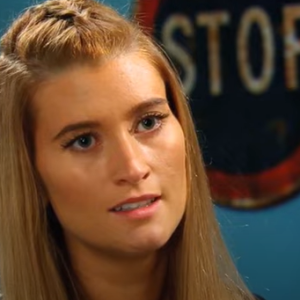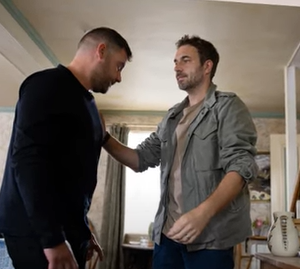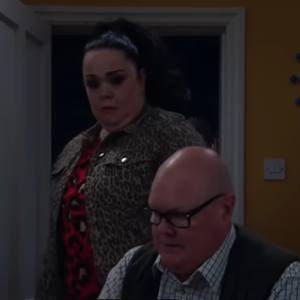Emmerdale is once again on the brink of turmoil as Moira Dingle faces the crushing reality of losing her beloved farm to the relentless advances of Kim Tate, who offers not just money but a bittersweet lifeline. In the latest twist, Moira’s world collapses under mounting financial pressure when a devastating ruling from the water company crushes her hopes of escaping the endless fines and legal costs for an environmental spill. The fine itself is brutal enough, but the administrative fees and cleanup costs pile onto her debts like a storm wave threatening to drown her family legacy. This isn’t just any farm; it’s a symbol of a lifetime of grit, loss, and survival for Moira, especially after the heartache of losing Nate. Yet, as the creditors close in and the farm’s future darkens, Kim steps in with an offer that on the surface seems like salvation — to buy the farm but allow Moira to stay on as a tenant farmer. The catch? She would no longer own the land she’s fought so hard to protect, relegated instead to a tenant dependent on the very enemy seeking to change the face of the Dales forever. Moira’s fierce pride clashes violently against the harsh truth: the farm industry’s decline and the mounting debts mean that without Kim’s intervention, her family might be forced out of the only home they have ever known. This deal isn’t just business; it’s a battle for identity and survival, wrapped in the emotional turmoil of letting go versus holding on.
The pressure cooker that is Moira’s life is further intensified by personal sacrifices and the sharp edges of village politics. Her beloved farm isn’t just a place of work but a sanctuary built through decades of struggle, marked by grief and family ties, especially with her sons Kane and Isaac watching anxiously. Joe Tate, Kim’s emissary and a player with his own agenda, makes a calculated move by delivering Kim’s offer personally — cold, businesslike yet steeped in the undercurrents of power and control. The deal’s terms are pitched as fair, but no one in Emmerdale knows better than Moira that “fair” is a contentious word in a game dominated by the Tate empire’s influence. The farmers’ community becomes a battlefield where small farms vanish one by one, swallowed up by corporate interests masked as generosity. Moira’s struggle represents a broader crisis, a rural way of life eroding under financial crises and environmental regulations that seem designed to squeeze out the underdogs. She’s torn between fighting a losing battle or accepting Kim’s offer, which promises a reprieve from the crushing debts but at the price of her autonomy and legacy. Her refusal would not just mean risking everything she owns but potentially fracturing her family’s future into uncertainty and hardship. As the village watches, the question hanging in the air is whether Moira can muster the strength to say goodbye to her past or if she will be forced into a future she never wanted.
Meanwhile, the emotional toll extends beyond the finances into Moira’s personal relationships, adding layers of poignancy and heartbreak to the story. The strain of potentially losing the farm weighs heavily on her, threatening the fragile fabric holding her family together in the aftermath of Nate’s tragic death. Kane finds himself caught in the middle, grappling with his own grief while supporting his mother’s fight, yet fearful of the inevitable consequences if the farm is lost. Meanwhile, the shadow of surrogacy and Charity’s struggles add another dimension to this web of drama, reminding viewers that every victory can come at a heartbreaking cost. Kim’s offer, while framed as a lifeline, also embodies the cold reality of power imbalance — a reminder that the very rich and influential often dictate who survives in the farming world, shaping not just land ownership but the soul of the community. Moira’s internal battle between hope and despair captures the essence of Emmerdale’s drama — raw, real, and emotionally wrenching. Her reluctance to accept the deal and the clinging to what remains of her family heritage portrays a woman not ready to give in but painfully aware that her fight may soon reach a devastating conclusion.
The complexity of this storyline is heightened by the backdrop of Emmerdale’s continuing power plays and shifting alliances, where no character’s fate is certain and every gesture carries weight. Kim Tate, often painted as the villain in the village’s recent history, surprisingly shows a different face here — one of a savvy businesswoman offering a solution that could save Moira but also consolidate her own power in the Dales. This duality adds a thrilling tension for viewers, torn between rooting for Moira’s independence and recognizing Kim’s offer as perhaps the only practical way forward. The subtle suggestion that Kim wants to protect the farm from bigger corporate developers paints her as a somewhat paradoxical savior — ruthless yet protective, calculated yet strangely considerate of the village’s heritage. This ambiguity enriches the drama, challenging viewers’ loyalties and assumptions about the characters’ motivations. Emmerdale expertly wields this tension, making every scene crackle with the possibility of betrayal, alliance, sacrifice, or unexpected turns. Through Kim and Moira’s fraught interactions, the series explores timeless themes of power, survival, and the cost of keeping one’s roots alive against all odds. 
Finally, Emmerdale’s portrayal of Moira’s dilemma culminates in a dramatic crescendo that grips viewers with suspense and empathy, as the farm’s fate hangs in precarious balance. Moira, once a formidable force, is now seen in moments of vulnerability — a woman fighting against time, debts, and the crushing weight of inevitability. The emotional stakes are higher than ever; the farm represents more than land, it embodies memories, identity, and the future of her family. The offer to become a tenant farmer strips Moira of ownership but promises a continued connection to this sacred ground, forcing her to confront whether survival requires surrender. In a village where loyalty and legacy mean everything, her decision will resonate deeply across Emmerdale, shaping the lives of those she loves and altering the landscape forever. The drama is not just in the negotiations but in the human cost — the sacrifices made in the name of family, the painful choices that define who survives and who fades away. It’s a story of resilience and heartbreak, power and pride, painting a gripping, emotionally charged picture that promises to keep viewers hooked, breathless, and aching for the next episode. Emmerdale once again proves why it stands as a master of dramatic storytelling, offering a raw, compelling saga of life, loss, and the relentlessness of change.





